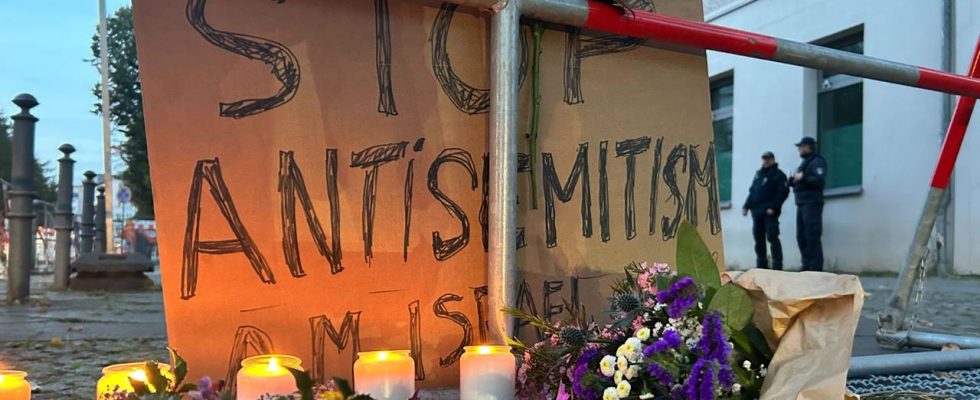Since Hamas’ attack on Israel, there has been an increase in anti-Semitic crimes in Germany. Because of the increased threat, Jewish life is also becoming less visible, says Central Council President Schuster.
There are fallen oil lights and posters on the floor. “You belong here,” it says on a sign, next to which the menorah, the seven-branched candlestick, is painted. Leaves and withered flowers cover a piece of cardboard that says “Against Anti-Semitism.”
Gestures of solidarity expressed last fall in front of the Kahal Adass Yisroel synagogue on Berlin’s Brunnenstrasse. But also a sign that the great waves of compassion were a while ago.
Back in mid-October, there was an attack on the buildings with a Molotov cocktail. It was one of the many crimes following the start of war in the Middle East on October 7, 2023.
Fear of attacks
Around 100 days later, “no normality has returned for Jews,” says Felix Klein, the Federal Government’s anti-Semitism commissioner. This was also shown by the figures from the Federal Criminal Police Office: 2,249 anti-Semitic crimes have been recorded since the beginning of the war. “A significant proportion were not committed shortly after October 7th, but weeks and months later,” emphasizes Klein.
At the same time, how much everyday life has changed for Jews has “disappeared from public consciousness.” Even today, Jewish families often don’t have a traditional mezuzah on their door frames – for fear of attacks, says Klein. “They continue to change Jewish-sounding names in ordering and taxi apps.”
It’s a constant “negotiation of visibility and security,” says Josef Schuster, President of the Central Council of Jews. The association asked its communities how they perceived the situation in these months since the start of the war.
The result: Cooperation with security authorities is going very well, but at the same time uncertainty remains high. Attendance at church services has decreased. Events with Jewish artists have been canceled. Schuster’s bitter conclusion: “Jewish life is less visible.”
Increased Danger situation
For the Berlin police, who have been confronted with a large part of the nationwide anti-Israel demonstrations since last October, there is still an increase in the already high level of abstract danger.
Accordingly, 163 Jewish or Israeli institutions in the capital are still being protected, says Martin Dams, spokesman for the Berlin police. “675 service personnel will be deployed for this purpose.”
The state of emergency has become a permanent operational situation – that’s what the numbers sound like. And this is what it looks like in front of the synagogue on Brunnenstrasse: In the fall, “only” a fence fenced off the sidewalk in front of the entrance, with two police officers next to it.
The community is now doubly secured. Red and white barges cordon off the area, with metal barriers behind them. The police officers greet children who are brought to daycare or school here. Excursions are still only possible to a very limited extent for them.
“With Lack of empathy confronted”
At least there was solidarity, even ongoing solidarity: for weeks, people came to the vigil in front of the synagogue every Friday. “They came in the rain, snow and cold,” the community wrote in a letter of thanks. “That gave us support and strength, but also hope and confidence that you, our neighbors, will always show your willingness to stand by our side, even if the vigil is no longer there.”
This year the solidarity meetings will take place once a month. But such actions are too rare, says Central Council President Schuster. “In their everyday lives, Jews are confronted with a lack of empathy.” There are numerous anti-Semitic incidents at work, in universities or among neighbors. “It’s often statements and comments,” says Schuster.
Starting today, the Central Council wants to call for more compassion and civil courage with a new campaign. And for solidarity that doesn’t get too comfortable: “Stop Repeating Stories” is the call that stories shouldn’t repeat themselves. In a video, a young woman says: “None of the neighbors asked how I was doing. They all just posted these crying emojis on WhatsApp.”
Large demos for cobblers “a good sign”
The slogan deliberately does not warn that “history repeats itself,” as it is so often said. Schuster sees an important difference from the 1930s: Today the state stands behind the Jews. But we want to appeal to society.
“The demos against right-wing extremism and the strengthening of the AfD in the past few days have been all the more important,” says Schuster. Right-wing extremism is “one of the greatest threats to democracy and Jewish life because it is so well organized.”
Schuster adds that he has always had the feeling that the AfD’s poll numbers and election results were visible. “But it didn’t really lure anyone out from behind the stove.” For him, the big demos are a good sign – and probably worth more than just a few emojis on the internet.
Vera Wolfskämpf, ARD Berlin, tagesschau, January 25, 2024 2:00 p.m

